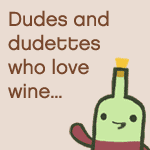 (images: wpsignsystems.com, organic.lovetoknow.com)
(images: wpsignsystems.com, organic.lovetoknow.com)
Those of you who have been following the Dude's blog know that when it comes to organic wines I have been, let's just say, less than kind in the past on the quality and viability of these products.
To provide yet another perspective in my ongoing love/hate affair with all things organic. my partner in crime Jason Whiteside has offered up some comments on the organic trends impact for wine consumers.
Jason fully acknowledges the marketplace trends towards organic products, even though he is not influenced by it himself per se (according to Jason, "I am not a vegan. Whatever the opposite eating style to vegan is, that is what I am.").
Organic-minded consumers should be aware of the hidden dangers in their wine bottles. According to Jason:
"Along with the wave of social food consciousness, it is natural to wonder about the wine we drink. Is it organic? Is wine OK for vegans to drink? What do we really know about the contents of any given bottle? Consumers who are sensitive to the use of animal products should know why and how animal products are used in the manufacture of wine. Eggs whites, isinglass (the powdered swim bladders of fish), and other proteins are used in the fining process, which helps make a wine clear."
"Often times, when wine is made, it has a hazy or cloudy appearance from suspended particles. Nobody wants to drink hazy wines, for most of us are rightfully programmed to believe a good wine should be clear and bright. So the winemaker will use a carefully measured amount of protein to help remove the haze. This works because the protein carries an electrostatic charge opposite to the particles in the haze. They cling to each other, and fall out of the wine as sediment. The clear wine is then racked off the sediment, which means that for practical purposes there is no clarifying agent (egg whites) left in the bottle."
For those who are over-the-top-serious about their organic shopping, even these fining procedures may not be enough:...
"But, who really knows if there is absolutely none left? Testing for that would be more expensive than it is worth." All is not entirely hopeless for these consumers, however: "As a consumer, it is relatively easy to find a list of wines that are either unfined or fined without animal products. This website lists vegan wine, and I have found it to be very helpful: http://vegans.frommars.org/wine. I recommend the wines from Rosenblum (especially their Petit Syrah) and Houghton Chardonnay, in particular."
All is not entirely hopeless for these consumers, however: "As a consumer, it is relatively easy to find a list of wines that are either unfined or fined without animal products. This website lists vegan wine, and I have found it to be very helpful: http://vegans.frommars.org/wine. I recommend the wines from Rosenblum (especially their Petit Syrah) and Houghton Chardonnay, in particular."
As for the current state of organic winemaking, Jason leans towards my assessment that good examples of these wines are harder to come by (but well worth the effort once you do finally get your hands on them):
"For consumers who look for organic or vegan wines, my hope is that more skilled winemakers take up the challenge of green winemaking. It is not an easy undertaking. Sulfur dioxide buys a winemaker a lot of time by keeping the grapes fresh, and fresh grapes mean better wine. If you want to see how fast harvested fruit starts to spoil in your own home, cut an apple in half, and see how long it takes to start to turn brown. The 'browning' is the effect oxygen has on fruit; sulfur dioxide protects against this. It will be difficult for winemakers to forever put away their chemicals, eggs, and fish bladders, and I for one would not ask them to. But, for those to whom this matters, know that quality wines are being made without the extra stuff. You just have to go out and find them."
Cheers!
Fresh Takes on Organic Wine
In the Blogosphere: How Wine Sulfite Regulations Impact Winemakers
The wine sulfites battle rages on. Some of you will recall that the Dude has been commenting on the topics of sulfites in wine, as well as biodynamic and organic wines.
Some of you will recall that the Dude has been commenting on the topics of sulfites in wine, as well as biodynamic and organic wines.
Jason Haas over at Tablas Creek Vineyard has posted a great article on how the widely misunderstood fear of wine sulfite allergies (& "wine headaches") has combined with overly-cautious (and poorly-constructed) U.S. wine regulations to cause winemakers unnecessary grief...
What U.S. Sulfite / Organic Regulations Mean for Winemakers
In a nutshell, it seems that the U.S. regulations regarding sulfite use for wines that are to be labeled 'organic' have a big negative impact on potential quality of the wine. That's because some use of sulfites in higher quality wines is inevitable - otherwise the finished wine could be too unstable.
According to the Guidelines for Labeling: Wine with Organic References from the U.S. Dept. of Treasury - Bureau of Alcohol, Tobacco, and Firearms:SULFITE STATEMENT
Less than 10 ppm of sulfites... hmm... good luck! I wrote about the challenges of achieving such a low level of sulfites in wine before. Those winemakers that chase after the pot-o'-gold at the end of the marketing rainbow may make "organic" wines, but that will need to be done without much thought to the ultimate quality of the wine. Those winemakers that truly care about quality - well, they end up being discouraged from even trying to make wines that would be labeled "organic" by the U.S. government.
“100% Organic” products cannot use added sulfi tes
in production. Therefore, since no add ed sulfi tes
are present in the fi nished product, the label may
not require a sulfi te statement. In these cases, a lab
analysis is necessary to verify that the wine contains
less than 10 ppm of sulfites.
What U.S. Sulfite / Organic Regulations Mean for You And who suffers the most - wine consumers. Because the average person is likely to a) be scared off because of the required sulfite warning labels on wines, often believing (mistakenly) that there last 'wine headache' was caused by sulfties, and b) assuming (mistakenly) that wines labeled as 'organic' are healthier and of higher quality, consumers can have a poor experience tasting a nasty unstable wine that is labeled 'organic' but sucks - and possibly get turned off to wine altogether because of that experience!
And who suffers the most - wine consumers. Because the average person is likely to a) be scared off because of the required sulfite warning labels on wines, often believing (mistakenly) that there last 'wine headache' was caused by sulfties, and b) assuming (mistakenly) that wines labeled as 'organic' are healthier and of higher quality, consumers can have a poor experience tasting a nasty unstable wine that is labeled 'organic' but sucks - and possibly get turned off to wine altogether because of that experience!
Don't Get Suckered into Following the 'Organic' Marketing Bandwagon
Unfortunately, it means that we wine lovers still need to have our wits about us when shopping for wine. Stay sharp, and don't assume that a wine labeled as 'organic' is better for you or is higher quality, or contains no sulfites. Higher quality wines will contain sulfites and probably will NOT be labeled organic - but they will taste better, and in the grand scheme of things will be better for you, will provide better value for money, and will give you a better wine tasting experience!
Cheers!
Update: More on Low-Sulfite Wines (Holiday Edition)
 Happy Holidays to all, and greetings from sunny FL!
Happy Holidays to all, and greetings from sunny FL!
A (very) quick update on my last post regarding low-sulfite wines, just to prove I'm not totally biased against all organic / biodynamic wines!
I've come across a few other quality wines (featured in body + soul magazine, to which my wife subscribes) that I've recently learned are either organically or biodynamically made (or both), and that I've found to be of good quality...
Thought I'd take a brief moment during my holiday respite to share these wine finds with you. Hope that anyone looking for low-sulfite wines (that don't also totally suck!) will find this helpful:
Cheers!
Vinted on
Wednesday, December 26, 2007
5
comments
Email This
![]()
Labels: best of, biodynamic, organic, organic wine, sulfites, wine, wine health, wine tips
How To (Not) Go Green (Organic Wines Still Suck)
Dude has seen quite a bit of press regarding organic and biodynamic wines, which are understandably riding the marketing wave of increased consumer demand for healthier, more naturally-made food products. At industry wine-tasting events, organic and biodynamic viticulture is touted at nearly every distributor's and/or winery's boot,h in order to get a edge over their adjacent competition for eyes, mouths, and wine orders.
At industry wine-tasting events, organic and biodynamic viticulture is touted at nearly every distributor's and/or winery's boot,h in order to get a edge over their adjacent competition for eyes, mouths, and wine orders.
Anyone who has had local, organically grown produce, or tasted a fresh hunk of free-range chicken right off the grill, knows firsthand that these products often taste better, are healthier for you, and are superior in quality to their mass-manufactured counterparts.
The story is a bit different when it comes to wines.
That's because most organic wines suck.
It's not just this dude's opinion - in 2005, Tom Stevenson (noted wine writer and critic, and the driving force behind the brilliant Sotheby's Wine Encyclopedia and the indispensable annual industry Wine Report) wrote the following regarding the state of organic wines:
- "When great winemakers... "go green" they produce great organic or biodynamic wines. However, it is quite another matter when others less passionate about the quality of wine are organic. While they may well have a true passion for the environment, the majority of the world's organic producers clearly have no idea how to make a superior quality wine."
As consumers, we're also confused about exactly what organic and biodynamic really mean. In summary, they are both government-regulated terms, meaning if you follow the production standards laid out by the government, then you're allowed to use those terms on the label. At a high level, this is what's required for winemakers to "go green":
- Organic: the wine is made with the minimum amount of sulfer dioxide, using grapes that have been grown without using chemically-based pesticides/herbicides and fertilizers.
- Biodynamic: the grapes are grown without using chemical or synthetic fertilizers & sprays; natural yeasts are used for fermentation of the wine, with minimal use of sulfer dioxide, filtration, and chapatalization (the addition of sugars to raise the potential alcohol in the finished wine - which happens much more often then you really want to know about...).
So, how have things fared in terms of quality standards for organic wines since the dire outlook penned by Mr. Steven in 2005? Not too good.
Most organic wines still suck.
A great example comes from the Organic Wine section of the 2007 Wine Report: according to the report, Chile (an ever-expanding hotbed of quality wine production) is becoming "a graveyard for failed organic projects" because in order to make quality wine some producers are running organic and non-organic wine growing systems in parallel - a total nightmare in terms of vineyard management.
The problem is that it's much easier to market organic than it is to make great organic wines. And if producers had figured out how to make top quality wine organically, they wouldn't need parallel systems - and certainly would have more certified organic acreage under vine.
Europe has, by far, the largest amount of certified-organic vineyard areas - just under 82,000 hectares, which sounds impressive but is only a "whopping" 2.2% of the total vineyard acreage. Half of that 2.2% is concentrated in just one country - Italy, whose farmers were subsidized heavily by the government to convert to organic! In the U.S., biodynamic conversions are on the rise, but the numbers are equally paltry - 1.7% in California (though Oregon is leading with just under 10%).
The moral of the story, at least for this dude, is not to jump too fast onto the organic bandwagon when it comes to wine. While there are some organic producers making top-notch stuff, if you don't know the producer and it says organic on the label, then it could (in fact, is likely to be) "green" plonk.
Vinted on
Saturday, December 01, 2007
1 comments
Email This
![]()
Labels: biodynamic, organic, organic wine, viticulture, wine, wine how to, wine tips


























